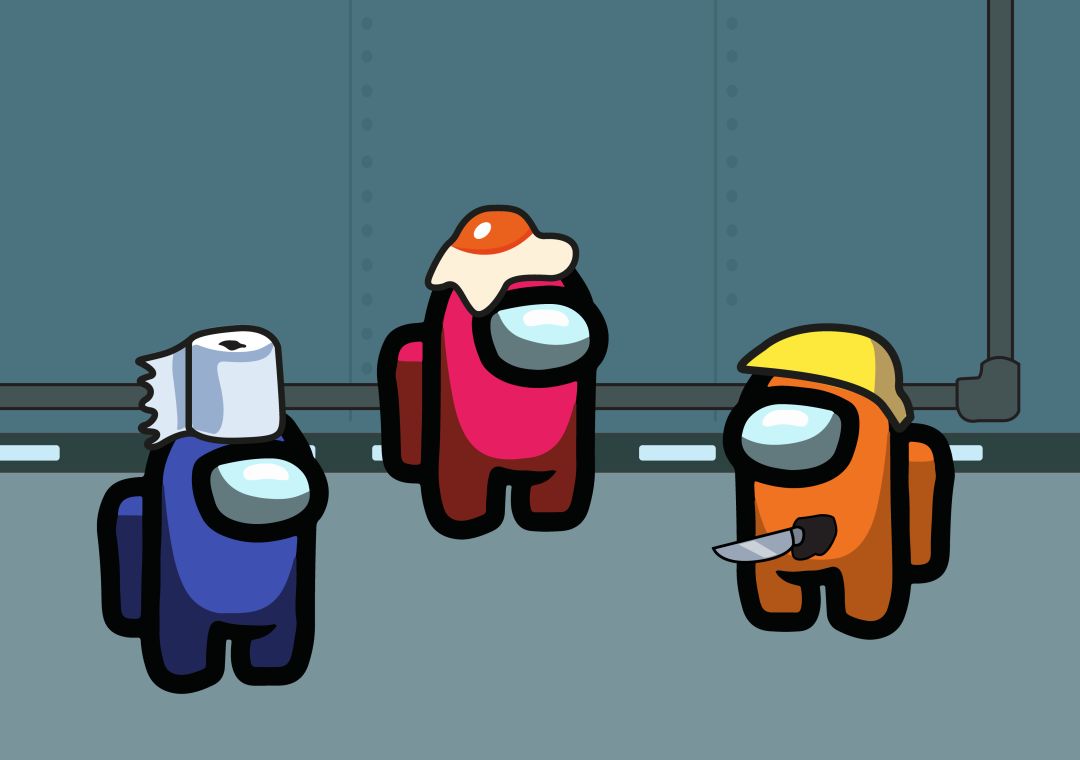How Among Us Became an Unlikely Mirror for 2020

On October 20, United States representative Alexandria Ocasio-Cortez took to Twitter saying she’d be on Twitch to “help folks make a voting plan at iwillvote.com and officially declare orange sus on Among Us.” To decode, for the very offline: Twitch is an Amazon-owned streaming service. Among Us is a video game from Redmond-based indie developer Innersloth. In the game 4–10 players try to fix a spaceship, but between one and three are imposters who sabotage and kill the others. “Sus” is short for suspicious. Orange can be one of the color-coded avatars, or the sitting president of the United States.
During that night’s over three-hour stream, AOC and representative Ilhan Omar joined eight popular Twitch personalities to get out the vote and play the game. Throughout players kept citing the joke. “In this situation orange is most definitely sus,” one said. “I think orange is extremely sus,” another said. The joke, beside an image of an orange Among Us character with a blond rug atop its head, now adorns t-shirts, hoodies, stickers, socks, mugs, and masks.
With that stream, which brought in the third biggest Twitch audience ever, peaking at 439,000 viewers, the game’s status was cemented. Among Us debuted quietly in 2018, but it took off this July when Twitch star Chance “Sodapoppin” Morris started playing. Since then the game—from a company that listed only three people on its “team” page until recently—has gone viral and been nominated for two Game Awards (Best Mobile Game and Best Multiplayer Game, with winners to be announced December 10). In the process, it’s become a strange reflection of this year.
Let’s unpack why: First, the characters are shaped like little beans (remember when you bought all those fucking beans?). Their faces are masks. The game started near Seattle, and comes from a company called Innersloth (as in the part of you that’s kept you on your couch for at least portions of the year). And in a year where so many of our interactions have been virtual, it’s a very social game.
While Among Us is ostensibly about fixing the ship and not getting murdered (or, if you’re an imposter, the opposites), it’s inspired by Mafia (or Werewolf), the parlor game invented by a Soviet psychology student in the 1980s. Like there, the real play in Among Us comes during meetings. In these, your little bean stops jittering around the ship, and the players—either via text or voice chat—convene to try to vote out an imposter. They spread disinformation, sow doubt, play dumb (“Where’s the control room?”). Your friends, or strangers on the internet, lie to your face. They conjure false narratives to make you doubt everything that you haven’t personally seen.
In the year of QAnon and “Plandemic”—a year in which surely someone close to you has perpetuated lies on the internet—that should sound familiar. There are nefarious actors spreading lies. And sometimes that can be enough to bring the whole system down. In the case of Among Us, it did.
Two days after that AOC stream made the game unavoidably political, a spam attack hit Among Us. Instead of filling up with imposter theories—or unnerving dating messages—the chat logs of hundreds of players got the same message: “You’re mad, I’m back. Subscribe to Eris Loris | Vote TRUMP 2020.” Eris Loris is a YouTube channel, with videos showing hacks for other games (the first video casually tosses out a racial slur in the title). Innersloth wrote on Twitter, “We’re super duper aware of the current hacking issue and we’re looking into it.” The company recommended people play private games for the time being.
The next day, the website Eurogamer published an interview with someone claiming to be Eris Loris. Loris, along with some helpers, claimed they’d affected 4.9 million players with the hack. Why the Trump bump? Same reason as AOC, apparently: “I’m a college student and I support Trump, with the election and this hopefully getting publicity wanted to add to that,” Loris said.
Innersloth updates quelled that particular attack, but weeks later, on November 17, James Sebree, a fan of the game, took to Medium with a post called “Hacking in Among Us.” Once he’d started playing around in the code, he found a slew of cheats and hacks. “I’d gone in assuming it would lack many security measures designed to thwart any unofficial modding… but I was shocked at how trivial it would be to actually cheat at the game,” he wrote. (Innersloth didn't accept an interview or respond to my email about fixing the hacks but told Wired last month that "it's looking into the issues.")
There is, of course, an irony here: A game built around imposter saboteurs has let real saboteurs rig the system. About the imposters in the game, you always learn the truth. About the people on the internet—with whom many of us have spent far too much time in an eerie simulacrum of social life this year—you do not.




